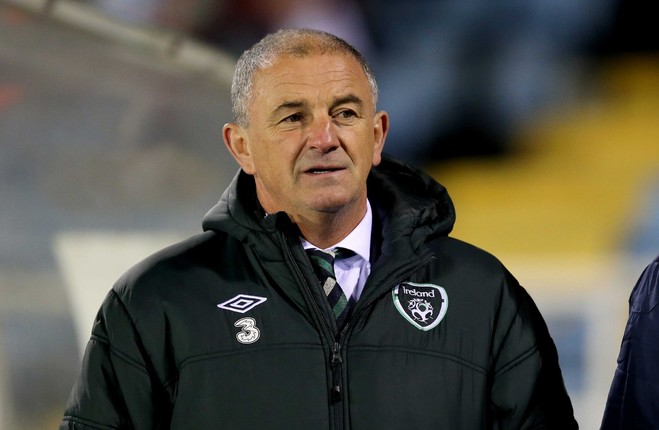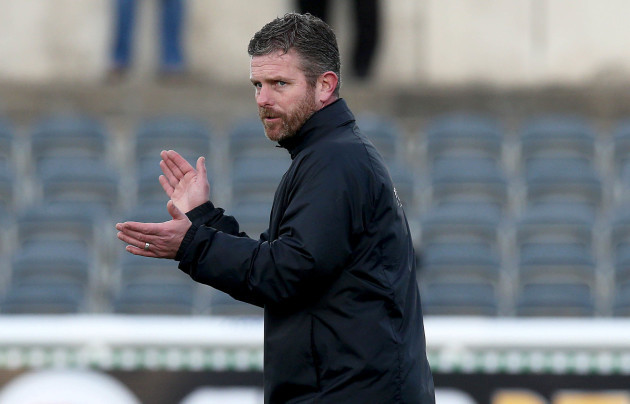IT’S AN ISSUE that’s been debated for decades. Whereas once the use of foreign-born players in international sport was considered somewhat controversial, it is now the norm.
Yet while it is commonplace in sport currently, that has not stopped the issue being brought up.
Part of the reason why it tends to provoke arguments so regularly is that it is such a complex matter. The national team certainly would not have achieved the level of success they enjoyed in football in recent decades had it not been for the contribution of players born outside of the Republic of Ireland.
Some individuals, such as Kevin Kilbane and Alan McLoughlin, have in the past spoken eloquently about why they consider themselves Irish despite being born abroad. Others would not necessarily have dreamed of playing for Ireland growing up, but gave everything to the cause once the opportunity arose.
It is a talking point in other sports too. Some critics have questioned whether naturalised players such as CJ Stander should be eligible for the Irish rugby team. Meanwhile, in athletics, Irish star Fionnuala McCormack has been heavily critical of Turkey’s use of Kenyan-born runners, while they are far from the only country who benefit from this rather lenient system.
The issue has been scrutinised particularly at underage level in football recently. Ireland’s 2014 U21 Player of the Year Jack Grealish’s decision to switch international allegiance to England was a particularly high-profile example of the controversy that dual nationality can prompt. Similarly, Michael Keane, who was capped by Ireland at U17 and U19 level, made his senior debut for England during the week against Germany.
In the U21 squad to face Kosovo later today, just five of the 19 players named — Danny Kane, Ryan Manning, Ethan Boyle, Olamide Shodipo and Jake Mulraney – were born in the Republic of Ireland.
The selection policy has subsequently encountered some criticism. Writing in the Irish Times on Friday, former League of Ireland player and current head of recruitment at Bohemians, Dave Henderson, commented:
Personally, I’m delighted when a player born abroad declares for us. But is anyone seriously suggesting that all of these lads are better than the ones we have developed here?
“Obviously I understand that the ‘bigger picture’ here is providing more options for the senior team manager a few years down the line. But it might be time that the FAI started to show a bit more confidence at this key level in the development of our players and the system it has been so central to shaping these past few years.”
King, speaking before the aforementioned piece was published, defended the widespread use of footballers born outside the country.
I played underage international football at U15 and U18 level, and I played with a lot of lads who were born in England. And the dynamic was different. But if you had a child who was born outside Ireland and you wanted him to play for Ireland, you have that right. Fifa have given us that right. Uefa have given us that right and I think it is right. It helps to make the country stronger.
“If we don’t do it, every country in the world is doing it. Germany are taking Turks in left, right and centre. If they’re the rules, you have to play by the rules of the game. We can’t be tying our hands behind our back and only sticking with the home-based or home-born players.
But it’s not as simple as that. Some of the guys we’ve had under us are so passionately Irish. They were born in London, but they played GAA in England. I remember Tony Grealish. He was born in London. I played with him at underage level. I never saw a more passionate Irishman than him and his dad.”
In addition to being U21 boss, King also acts as the FAI’s head of recruitment.
“We spend a lot of time up and down the motorways of England and Ireland. We have a lot of people working for us over there and in Ireland. It’s an area that’s pretty much ignored by everybody, but it’s a key area.
At all levels of the game we’re looking to bring better players in potentially, and then monitor their development. The aim is to get the best players for the senior team to do the best that they possibly can, which they have been doing, qualifying for tournaments and then hopefully getting to a quarter-final, semi-final or whatever the dream may be, but it’s a tough ask for a country of our size to go and win the World Cup at any level.”
And does he get frustrated at players such as Keane and Grealish, who end up choosing England after the hard work put in to recruiting these youngsters?
I don’t mind that because you can’t win every battle. We lost Jack Grealish, a great young fella. He’s doing alright, not as well as he possibly thought. That’s a shame, I don’t take any pleasure in that. But he was good for us and when he played for us, he was a good kid.
“I met himself and his father after (the decision to switch to England was made) and wished him the very best, genuinely, because you want the kid to succeed, and while he was with us, he gave the very best that he had.
It is complex and you won’t know until his career is over whether it was the right thing. You just move on to the next case, he moves on to Villa, tries to get into the first team and the English team, and I personally hope he does (get into the English team).”
King has been in charge of the U21s since 2010. Before that, he had stints at the helm of several League of Ireland clubs, including Derry and Limerick, and also oversaw the Irish women’s team’s placing as runners-up at the 2010 Uefa Championship along with their qualification for the World Cup. He also had a brief temporary stint in charge of the senior team in between the Giovanni Trapattoni and Martin O’Neill eras.
The last campaign for the U21s was considered a disappointment overall. They finished the group in fourth position, picking up four wins out of 10, overcoming Andorra (twice), Lithuania and Slovenia, but also suffering comprehensive defeats to Italy and Serbia.
Nevertheless, King is optimistic about his side’s chances as they prepare to face Kosovo later today. Germany, Israel, Norway and Azerbaijan also feature in their group, with only first place guaranteed to qualify for the 2019 Uefa U21 Championships Finals tournament in Italy and San Marino, though the Boys in Green could also advance as one of the four best runners-up.
I think we’ve done okay in terms of percentage of wins, but there’s not one person who wouldn’t want to qualify and give it a right shot,” King says. “I think that’s the mood we have to approach it with in this campaign.”
A new campaign means a number of new faces, with QPR’s Ryan Manning and Aston Villa’s Rory Hale among the squad debutants. Former international Mark Kinsella, who came on board as an Ireland U21s assistant coach in April of last year, likes what he sees.
First impressions are very good. There are some good characters, some quiet characters, so it’ll be nice to see how they gel in the next couple of days.”
And while winning games makes life much easier, helping players progress through to senior level remains the most vital part of King and co’s jobs. They have had some joy in this regard over the years, with notable names having worked under the 60-year-old coach, including Robbie Brady, Jeff Hendrick, James McCarthy and more recently, Callum O’Dowda.
However, more than ever now, there is a trend of young Irish players taking extra time to force their way into Martin O’Neill’s plans.
The likes of Jon Walters and Wes Hoolahan were late bloomers at international level, while 25-year-olds were for the first time made eligible for this year’s FAI Young Player of Year award because of the dearth of youngsters making the senior team. More recently, it is inexperienced players in their mid-20s that are starting to make some headway, with the likes of John Egan and Conor Hourihane finally getting in the final squad against Wales a number of years after they represented Ireland at underage level.
Kinsella himself can relate to the likes of Hourihane and Egan, who have made their way up the divisions after being let go by Premier League clubs at a young age.
We might have great midfield players, but (Martin O’Neill) might want a left-back. He might just be a solid left-back for us, but Martin might snatch him away for a training session for a week. That gives him an opportunity. It might be someone where I thought: ‘Well, I didn’t see that happening.’
“Managers see different things in different players. That’s why you never see the same managers rate the same players. Someone might turn a player down and another might pay €12 million for him. It’s just the way it is. But you need a bit of luck.
“I left the U21s and it took six years to make my senior debut. You get a taste of it and when you get a taste of it, you want more of it. Again, I was in the old fourth division (starting off with Colchester), so I needed to progress myself, to go higher up the divisions to get a chance with the seniors.”
Ireland’s opening Uefa European U21 Championship qualification match against Kosovo kicks-off at 1pm today in Tallaght Stadium.


